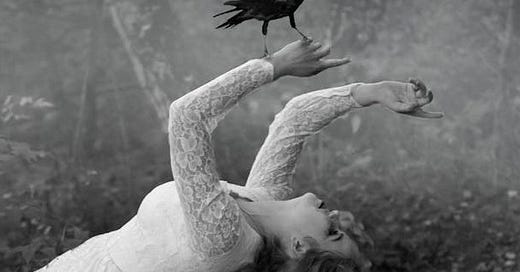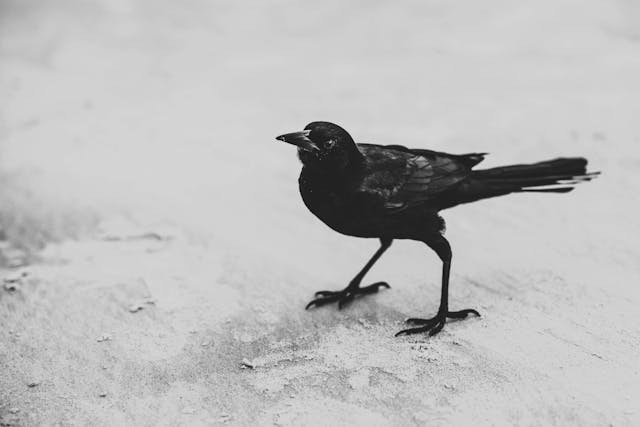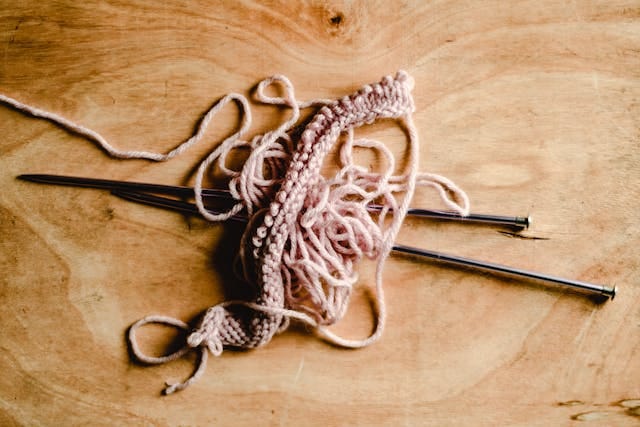Who Mourns the Raven When It Dies?
A Contemplation of Transgenerational Grief, Trauma, and Loss
Note from the author: Family Scapegoating Abuse (FSA) is a complex and deeply wounding form of trauma that often extends beyond individual experiences, touching upon the unaddressed pain and unresolved issues of previous generations. Adult survivors of FSA frequently grapple with what is known as transgenerational grief—a profound sorrow not only for what they personally endured but also for the losses and suffering that have been passed down through their family line.
The below personal reflection was also in part inspired by a “moody” art song composed by Alban Maria Johannes Berg, who was an Austrian composer of the Second Viennese School. The song Die Nachtigall (‘The Nightengale’) is a German Lied, and as a classically trained soprano, it is one of my favorite songs to sing, perhaps because it is pensive and mournful (ironically, the very words used to describe me as a child at times). You may wish to listen to the song below, sung beautifully by Barbara Bonney, prior to reading this piece on Transgenerational grief, trauma, and loss. I have also included both the German lyrics and the English translation below.
Die Nachtigall
German source: Theodor Storm
Das macht, es hat die Nachtigall
Die ganze Nacht gesungen;
Da sind von ihrem süssen Schall,
Da sind in Hall und Widerhall
Die Rosen aufgesprungen.
Sie war doch sonst ein wildes Blut,
Nun geht sie tief in Sinnen;
Trägt in der Hand den Sommerhut
Und duldet still der Sonne Glut
Und weiß nicht, was beginnen.
Das macht, es hat die Nachtigall
Die ganze Nacht gesungen;
Da sind von ihrem süssen Schall,
Da sind in Hall und Widerhall
Die Rosen aufgesprungen.
The Nightingale
English translation © Richard Stokes
It is because the nightingale
Has sung throughout the night,
That from the sweet sound
Of her echoing song
The roses have sprung up.
She was once a wild creature,
Now she wanders deep in thought;
In her hand a summer hat,
Bearing in silence the sun’s heat,
Not knowing what to do.
It is because the nightingale
Has sung throughout the night,
That from the sweet sound
Of her echoing song
The roses have sprung up.
Translations by Richard Stokes, author of The Book of Lieder (Faber, 2005)
Who Mourns the Raven When It Dies?
Under a sky the color of aging pewter, the rain begins, a soft, insistent tapping on the roof.
She leans against the window, the glass icy and hard against her forehead.
The garden, once vibrant, now blurs into shades of gray and green, mirroring the distant sea. She remembers a baby raven she once saved after it had fallen from its nest. It had a distinct white marking on one wing. She named it ‘Rumi’.
For years she would see Rumi flying back and forth near the window of the loft, tending to his business. But this past year, no more.
Outside, a few ravens (but not her raven) peck at something unseen in the overgrown beach grass. She remembers that ravens are often viewed as omens - symbols of endings.
But even omens have their own endings.
When a raven falls, quiet and still, to the sandy ground, does the ocean notice? Does the wind carry a whisper of its final departure?
Who mourns the raven when it dies?
She traces the rim of her grandmother’s Haviland teacup, the porcelain cooling against her fingertips. A grandmother she never knew, who died of a second stroke in her fifties upon learning her husband had been killed by a ‘hit-and-run’ (drunk) driver.
And her other grandmother (Swedish), who fell down dead in her forties while walking down the street with her husband. He held her in his strong, farmer’s arms as she died in the shoe store he had carried her to, as reported in the local paper. He never remarried, and decades later, ill with emphysema, shot himself in the head so as not to be a burden on his family.
So much sudden death. The mysterious, absent grandmothers and grandfathers whose existence - faces, smiles, eyes - she could only imagine.
Holding the delicate, gold-rimmed cup, she feels the quiet weight of lives cut short, losses unfelt, and the fragile memories left behind.
The teacup offers no answers, only the cold, smooth curve of what was left behind. It is a stark comfort, this object that has outlived its previous owners, and will likely outlive her as well, a silent witness to unremembered lives.
There was a time when her own life felt interwoven with others, a tapestry of shared meals and familiar voices. But somewhere along the way, the threads were snipped, one by one. Not with malice, but with a slow, exhausted severing.
She became the loose end, the discarded piece that no longer fit the pattern. Like the teacup she held that was taken from the priceless dinnerware set nobody else wanted. Her place in the family story eliminated into blankness, leaving instead something cracked, broken, erased.
Now, the movements of her days are punctuated by the distant cries of birds. She is all too aware that when her own thread finally breaks, there will be no one to gather the fragments, no hand to smooth the wrinkles of her absence.
She is like the solitary raven that circles the old growth, its calls echoing through the tangled serenity of the woods. When that raven falls, no other will mark its passing.
The endless waves echo the voices of forgotten kin, rising with the ocean's breath as she harbors the grief of her ancestors.
As the raven's final flight vanishes into the vast beyond, so too awaits her own eventual fading. No children will call her name. No grandchildren will recall her face.
Now, just the quiet settling of dust, the rustle of shore pines in the yard, and a harshly lit truth: Like all those quietly cast away, she, too, will eventually dissolve into the periphery, her passing barely a ripple in the larger world.
Beneath the watchful gaze of circling ravens, her mourning song joins the wind's lament.
Copyright 2025 | Rebecca C. Mandeville | All Rights Reserved










I am sobbing, this is so beautiful. And how i relate to this - and love Ravens. Such “discarded” and feared (symbol of death) birds but such high intelligence, communication and interaction to the world he is in. I am connected to the birds and wildlife in our environment. The sentient Saguaro cactus are guardians and relatives. We take care of 5 at our home. In the last year of extremes and breaking out of FSA, severing the toxic ties and its cages i have thought often of my mortality. And as i settle, it’s not uncomfortable because i am gaining my peace, balance, and gratitude of being me now. In this life and beyond. My choices now, not the sacrifice at the altar of trauma and abuse.
Such a beautiful story of the Raven. Thank you.
I'm crying too. Very familiar to me as well. I often think of the waves of the ocean coming and simply washing over my life until there is no trace of me. At least not HERE. But I am sure I will go on. Into another life, another body, another set of relationships to continue learning in. I also often think how far humanity has to come, and has had to come, to reach even this disheveled state we are currently exhibiting. Looking at things very long term, I believe so much seemingly wasted suffering is actually helping to build a scaffolding for improved human relationships. Look how hard those of us affected by FSA, and those of us who miraculously found our way to this substack (thank you Rebecca!), are working, reaching for something better for ourselves and our descendants. This is the power of love. A Course in Miracles says everything is either love or a call for love. I feel the love in the FSA healing group, in the people called to this substack, and in what I perceive as heavenly helpers hovering all around as we move closer to the Center where the "will of God is known". I don't think we can remain lost, because we have a perfect Guide within us. By joining together, buoying each other, we have more than a chance of positive change, we ARE that. Thank you Rebecca, for your heartfelt expression. It is a lovely refection of your soul. Hugs and big love.